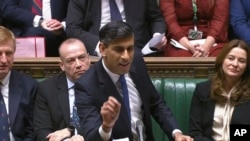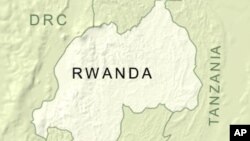U.K. Prime Minister Rishi Sunak quelled a Conservative Party rebellion and got his stalled plan to send some asylum-seekers on a one-way trip to Rwanda through the House of Commons on Wednesday.
Lawmakers voted 320-276 to back a bill intended to overcome a U.K. Supreme Court block on the Rwanda plan. But the contentious immigration policy on which Sunak has staked his authority still faces political and legal hurdles. And Sunak remains at the helm of a divided and demoralized party that is lagging in the polls.
The vote came a day after some 60 members of Sunak's governing Conservatives rebelled in an effort to make the legislation tougher. The dissent cost Sunak two party deputy chairmen, who quit in order to vote against the government.
But when it came to a vote on the bill as a whole, the rebellion melted away, and only 11 Conservatives voted against the legislation.
A larger rebellion Wednesday would have doomed the Safety of Rwanda Bill, and imperiled Sunak's 15-month-old government.
"It's this bill or no bill. It's this bill or no chance," Conservative lawmaker Bob Seely told colleagues before the vote.
The bill now goes to the unelected House of Lords, Parliament's upper chamber, where it faces more opposition.
With polls showing the Conservatives trailing far behind the Labour opposition in opinion polls, Sunak has made the controversial — and expensive — immigration policy central to his attempt to win an election this year.
He argues that deporting unauthorized asylum-seekers will deter people from making risky journeys across the English Channel and break the business model of people-smuggling gangs.
"We have a plan. It's working," Sunak said Wednesday in the House of Commons.
He needs to convince fellow Conservatives, as well as voters, that it's true. But the liberal and law-and-order wings of the Conservatives — always uneasy allies — are at loggerheads over the Rwanda plan.
Moderates worry the policy is too extreme, concerns underscored when the United Nations' refugee agency said this week the Rwanda plan "is not compatible with international refugee law."
However, many on the party's powerful right wing think the bill doesn't go far enough in deterring migration to the U.K. Hard-liners' attempts to toughen the bill on Wednesday failed as lawmakers rejected several amendments, including one that would have let British authorities routinely ignore emergency injunctions from the European Court of Human Rights.
Critics say that would breach international law, but Suella Braverman, a former interior minister and leading hard-liner, said the "foreign" European court was "currently controlling this country's ability to stop the boats."
Many rebels grudgingly voted for the bill rather than risk sinking the whole policy, but they remain unhappy.
Sunak insists the bill goes as far as the government can because Rwanda will pull out of its agreement to rehouse asylum-seekers if the U.K. breaks international law.
Labour Party leader Keir Starmer said the Conservatives are tearing themselves apart over the plan, like "hundreds of bald men scrapping over a single broken comb."
The Rwanda policy is key to Sunak's pledge to "stop the boats "bringing unauthorized migrants to the U.K. across the English Channel from France. More than 29,000 people made the perilous journey in 2023, down from 42,000 the year before. Five people died last week while trying to launch a boat from northern France in the dark and winter cold.
London and Kigali made a deal almost two years ago under which migrants who reach Britain across the Channel would be sent to Rwanda, where they would stay permanently. Britain has paid Rwanda at least 240 million pounds ($305 million) under the agreement, but no one has yet been sent to the East African country.
Human rights groups have criticized the plan as inhumane and unworkable. After it was challenged in British courts, the U.K. Supreme Court ruled in November that the policy was illegal because Rwanda isn't a safe country for refugees.
In response to the court ruling, Britain and Rwanda signed a treaty pledging to strengthen protections for migrants. Sunak's government argues the treaty allows it to pass a law declaring Rwanda a safe destination.
If approved by Parliament, the law would allow the government to "disapply" sections of U.K. human rights law when it comes to Rwanda-related asylum claims and make it harder to challenge the deportations in court.
The bill is sure to face more opposition in coming weeks in the House of Lords, where Sunak's Conservatives do not have a majority. The Lords can delay and amend legislation but ultimately can't overrule the elected House of Commons.
Rwandan officials suggested they were growing tired of the British drama around the deal. President Paul Kagame said it was "the U.K.'s problem, not Rwanda's problem" that no asylum-seekers have been sent to the country.
"If they don't come, we can return the money," Kagame told the BBC at the World Economic Forum in Davos, Switzerland.





